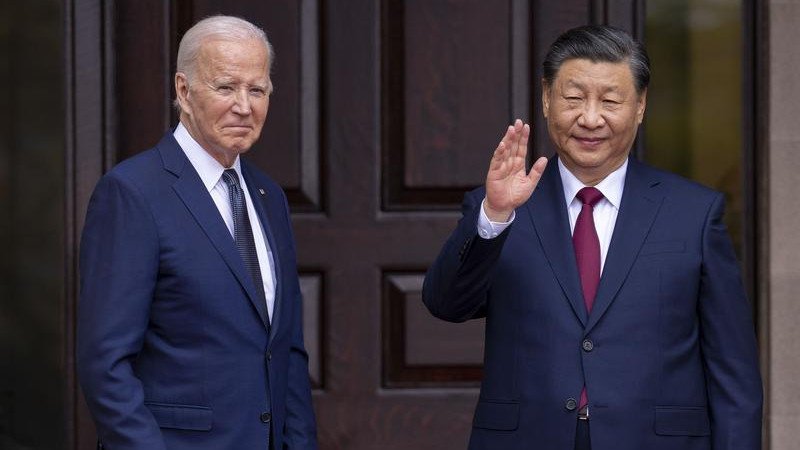US President Joe Biden and China’s Xi Jinping close to meeting to ease tensions between superpowers
‘Stop arming Taiwan and support peaceful reunification of China’: China’s advice as Biden and Xi Jinping consider new round of talks.

Top Chinese and US officials have discussed holding fresh talks between their heads of state shortly, Chinese state media says, after China’s top diplomat, Wang Yi met US national security adviser Jake Sullivan in Beijing.
Both sides also agreed to hold video calls between their military theatre commanders “at an appropriate time”, according to the Chinese readout from the meetings, a move that Washington hopes could prevent conflict in areas like the Taiwan Strait.
“The key to the smooth development of China-US interaction lies in treating each other as equals,” Wang told Sullivan according to state broadcaster CCTV.
Sign up to The Nightly's newsletters.
Get the first look at the digital newspaper, curated daily stories and breaking headlines delivered to your inbox.
By continuing you agree to our Terms and Privacy Policy.This is Sullivan’s second day of talks with Wang and others, aimed at calming tensions between the two superpowers ahead of the US election.
The meetings will last until Thursday, and are expected to cover a range of areas where the two countries are at odds, including trade, the Middle East, Ukraine, and Chinese territorial claims from Taiwan to the South China Sea.
Wang told Sullivan the US should “stop arming Taiwan and support peaceful ‘reunification’ of China”, adding that “Taiwan belongs to China and that ‘Taiwan independence’ is the biggest risk to peace and stability in the Taiwan Strait”.
According to the Chinese readout, Wang also expressed Beijing’s disapproval of US tariffs on a range of manufactured goods and export controls targeting Chinese chip makers, saying Washington should “stop jeopardising China’s legitimate interests”.
China, the world’s second-largest economy, whose vessels have repeatedly clashed with Philippine ships in the South China Sea, said the US “must not undermine China’s sovereignty... nor support Philippines’ ‘infringing acts’”.
Manila and Washington have a mutual defence treaty and the US has vowed to aid the Philippines against armed attacks on its vessels and soldiers in the South China Sea.
In the final months of his presidency, US President Joe Biden has pushed direct diplomacy to influence Chinese President Xi Jinping to help keep tensions at bay. US Vice President Kamala Harris, the Democratic candidate in November’s election, would likely pursue a similar strategy if she succeeds Biden.
In April, Biden and Xi navigated their countries’ disagreements in a phone call, after deciding to significantly improve bilateral ties during a summit in San Francisco last November following a deep division over trade and the COVID pandemic.
However, many analysts aligned with Republican former president Donald Trump see that approach as too soft, in the face of a more assertive Chinese foreign policy. Trump is his party’s presidential candidate again in the November election.
The US also wants China to take more action at home to prevent the development of chemicals that can be made into fentanyl, the leading cause of US drug overdoses, and reach an understanding of safety standards for artificial intelligence.
